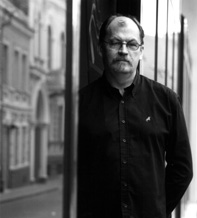|

photo: Arūnas Baltėnas
|
In the late seventies and early eighties
Algirdas Martinaitis (b. 1950) became one of the leading neo-romantic composers in Lithuania. Today he is a recognised professional, who has skilfully mastered the subtleties of different music genres from songs and incidental music to operas for children and symphonic music. In his recent works, the composer consistently provokes reflection on the boundaries of authorship, opposing categories of individuality and originality with allusions to banality, mimicry, and repetition. Into his scores he integrates music by composers mentally close to him, either by directly alluding to other people's work, or by saturating his pieces with reflections on them. Both from the point of view of inspiration and the actual material, Martinaitis' music draws on different epoques of Western music – Baroque, Classicism, Romanticism, Avant-garde - as well as Lithuanian folk, oriental, rock and pop music. The composer, who does not lack self-directed irony, calls it 'second-hand' or 'post-system' music, i.e. the type of music that is not based on any self-made or adopted system, nor on technique, nor, by any means, on theory. However, music is not the sole source of inspiration for him. Martinaitis draws on wide cultural surroundings: cinema, literature (the composer used to write poetry himself under the pseudonym of Martynas Raseinis), the Holy Script, and art: "I am more concerned with common intellectual matters. Out of what I do and what I am interested in the sound gets 10 percent at best. When writing music, I fill those 10 percent not only with what belongs to music, but with the remaining percent consisting of the surroundings and different kinds of information. They are the true basis of music - not the one tenth. In my case the audience is supposed to feel a certain cultural background, similarities that would not make them feel obliged to know or understand everything."
In his latest work
Bienenmensch for string quartet,
sutartinės singers and tape (the piece was premiered in March at the
MaerzMusik festival, Berlin, by the
Chordos String Quartet,
Trys keturiose singers and the composer himself) he is aiming towards common human communication. He deliberately does not fix the different music layers that spill and fly through the ears of the audience in separate fragments, which are hinted at rather than heard. "Sudden movement, directionality and flow of second-long events stand out in my concert for violin
Eurassic Park (2002), too. It is being done with the aim that the sound is always quicker than the hearing, which makes it impossible to identify the events. I call it 'music of quick events'. The listener is left to look through the window, while the car is dashing at the speed of 140 km/h...", says the composer, having concluded a serious talk, as always, with a joke. Layers of different elements, i.e.
sutartinės about bees performed by a folk group, fragments from the introduction of
Tristan and Isolde, the last words of Schiller’s
Ode to the Joy recited at the initial and the final parts of the quartet, and the recorded buzz of bees, are vertically stacked one onto another without any system. The composer explains as follows: "Music is systemised by different things, in this case, by the image of bees searching for honey, i.e. the ideal. Dressed as a beekeeper I open the grand piano and get into it to 'take honey', creating some noise. At the end of the piece I take a honeycomb out of the piano."
Algirdas Martinaitis is one of the composers who, in the same way as beekeepers, likes systematically taking the honey out of the 'beehive' of his own creativity, i.e. remaking his old pieces for new sets of instruments or filling them with new conceptions. Therefore, the same titles sometimes hide absolutely different versions of the same piece. The
Song-thrush's Apprentice (1997) for solo flute is a good example of this. The new version was first performed on April 2 at the
Lithuanian National Philharmonic by the distinguished flutist Algirdas Vizgirda.
Out of a 6-minute piece it grew into a 10 minute long, three-part sonata with the option of performing the parts separately. According to the composer, the type of music is decided by the titles of the parts. Martinaitis: "Everything depends on the play of words. The title idea for the piece came from
The Sorcerer's Apprentice by Paul Dukas. Later on I started looking for phrases about thrush in a dictionary. In French the 'white thrush' means almost the same as the 'black sheep'. This is what I called the second part, in which the imprint of the French culture, its otherness, is highlighted. The third part,
What a Bird!, is a rondo. It is a constant return, albeit each time to a different variation."
The list of chamber pieces that make the core of Martinaitis' wide-ranging oeuvre is soon going to be extended by a new and still untitled vocal composition for baritone, violin, cello and piano set to the texts of Thomas Mann's
Doctor Faustus. The premiere will be held at the
Thomas Mann Festival in July, where it will be performed by the Polish baritone Benon Maliszewski and the Kaskados Trio.
© Veronika Janatjeva
Lithuanian Music Link No. 6

